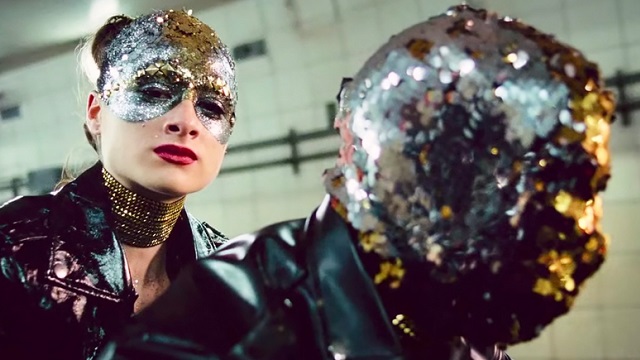Vox Lux is not what you think it is, and it isn’t what it is being sold as. Vox Lux is a two-act drama play made out of the birth and re-birth of a mediocre pop star borne out of a bloodbath.
In 1999, Celeste (Raffey Cassidy) is the survivor of a Staten Island school shooting, shot in her spine as the dead bodies piled up behind her. In the opening scene, Corbet pulls few punches, portraying the graphic, horrific violence as sudden and shocking – capable of offending a nation. From the violence arises Act 1: Genesis and Celeste the Pop Star. Armed with a Casio keyboard at a shooting memorial, Celeste and her sister Eleanor (Stacy Martin) sings a song of tragic pain, striking a nerve in a nation that just wants to heal from the situation. Nobody seems to care that she’s constantly flat, Celeste becomes a symbol that becomes a superstar under the watchful guise of her gross sleazy Manager (Jude Law).
Fast forwarding from 2001 to 2017, Superstar Celeste (now played by Natalie Portman) and her ego have faced many trials and tribulations, including going blind in one eye and running over a black pedestrian before going on a racist tirade. Act 2 takes place on a single day: the first date of Celeste’s new tour, a combo reassessment of her life and washing of her image in a rebirth. Now transformed into some kind of Borderline narcissist, Celeste is faced with more mass violence in a remote part of the world as she has to deal with her past (daughter, manager, songwriter-sister) to try to make her way into the present.
Vox Lux isn’t so much about the story as it is about the lead up to a pop star on stage. Inside, Celeste is scared and frightened, but she has to project herself as a strong fierce warrior. That image and persona has to exist on stage and in real life, but the lines are blurred for what is appropriate and what isn’t; what is real and what isn’t. Far from being a Black Swan dive into surreality, Vox Lux remains steadfastly in the heightened realism of a pop star. Corbet’s screenplay is talky, dark, and nervy, having no mercy for either Celeste, the public, the media, or even pop culture itself.
Like the form itself, Vox Lux is a tale of duality. Celeste makes shitty music with a bad stage show where her only costume change is putting on a feathered cape (goddamn, Corbet really wants me to compare this to Black Swan); but the stage show and the music are effective calls for happiness and emotional togetherness. Though the whole act is shallow, they present a chance to heal…or do they? Willem Dafoe, the film’s narrator, suggests another reason for Celeste’s fame and fortune; a Neon Demon of sorts. Shortly after, the stage behind her alternates between PRAY and PREY in a pseudo-profound provocation.
Vox Lux is A Star Is Born where the rising star turns into an asshole, and the failing husband is America itself. Celeste states that she doesn’t want people to have to think deeply, she just wants people to feel good. On those feelings of forgiveness, we forget the bloodshed of the school shooting and the bloodshed happening in other parts of the world. We lose our cares and seek bliss on the dance floor.
In last year’s BPM, Robin Campillo posits that fighters can’t fight all the time and need the dance floor to re-energize and maintain their humanity. By using provocative real world violence, Corbet asks whether the majority of people are fighting anything tangible or whether they’re just being subjected to mind control through the release of dance floor endorphins and meaningless songs by a shallow nitwit who doesn’t even write her own music.
Even though Brady Corbet wrote and directed Vox Lux, a lot of credit must be directed to Sia, the 42-year-old singer-songwriter who has increasingly expressed disdain for the music business, fame, and pop music in general. In interviews, she criticized her fame and the lack of boundaries that come with it. In Rolling Stone, she recounted a story about being told her friend had cancer…and, in the middle of it, having a fan interrupt them for a photo. This scene is recreated when Celeste takes her daughter to lunch at a diner only to have their conversation interrupted by the manager who demands she interrupts her conversation to take a photo with him. Let’s not forget Sia’s infamous work for South Park where she wrote the song Push (Feeling Good on a Wednesday) for Randy as Lorde. The song was written by Randy in the women’s restroom trying to push out a midweek turd, but turns into a feel good pop hit embraced by America and even Shelly. In a way, that song, and South Park‘s Lorde story arc, are reflective of the disdain Vox Lux expresses about “meaningful” “feel good” pop music and the music industry in general.
Is Vox Lux another feel bad warning about the shallowness of American pop culture? Is it an existential horror posing as a human drama? Whatever it is, Vox Lux is a stunning and bizarre provocation that frequently threatens to turn into The Apple or amateur Black Swan but never quite acknowledges its own camp value.


